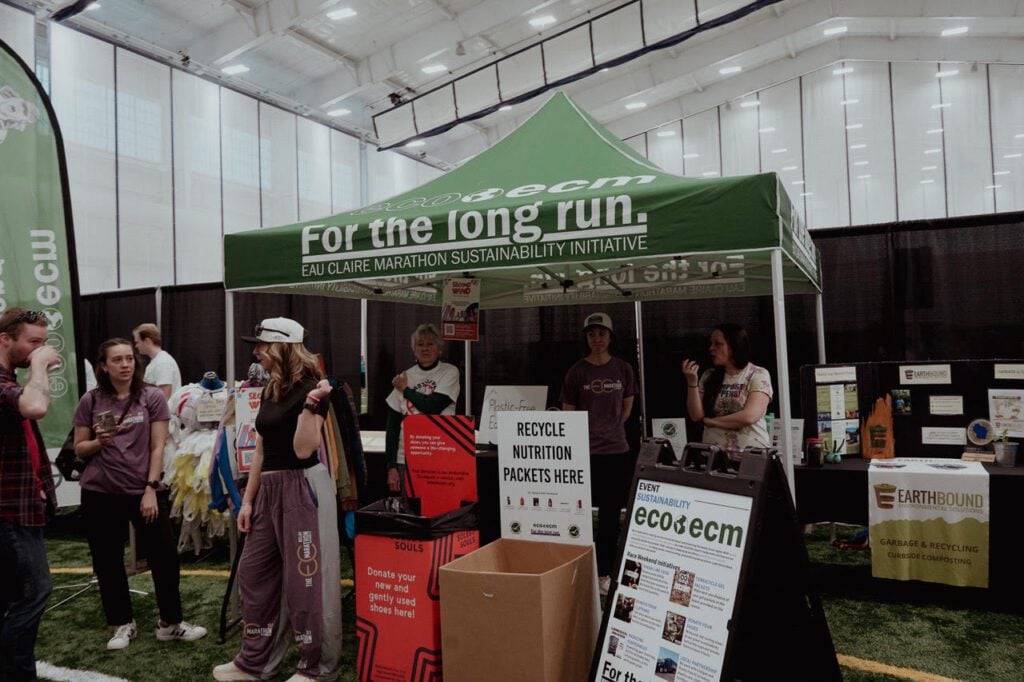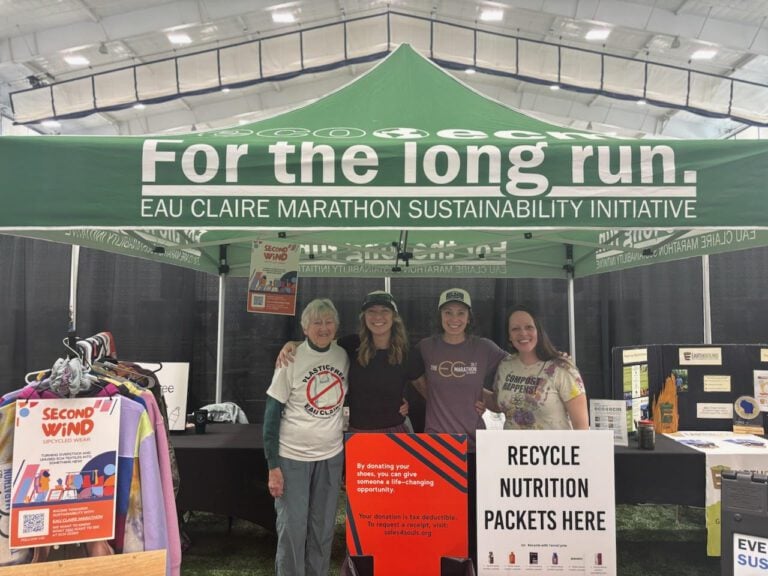Guest Post from Racing for Sustainability.
Tina Muir loves working with some of the world’s biggest races on their sustainability initiatives, but she couldn’t help but feel a disconnect between them and more “typical” races – ones that don’t have big budgets and full-time staff dedicated to making their events eco-conscious. That’s why she created Racing for Sustainability, a 501(c)(3) nonprofit that helps race directors reduce their environmental impact and amplify their accomplishments—without needing the resources of a major marathon.
With the pieces in place, there was only one element missing from Racing for Sustainability – proof of concept. That was provided by the Eau Claire Marathon. Kayse Elmquist, who heads up the marathon’s sustainability initiatives, had reached out to Tina to ask if she could help them achieve their ambition of becoming Wisconsin’s most sustainable marathon. Eau Claire became an inaugural member of Racing for Sustainability and earned RFS certification within a month of joining – all before the nonprofit’s official launch!

With their sustainability goal in mind, Eau Claire already had some actions in place, but Kayse found that RFS’s resources made implementing them easier.
“The Racing for Sustainability materials provided a template for how we at the Eau Claire Marathon can grow our sustainability initiative, with clear, actionable goals and ways we can achieve them. For example, the communication templates are fantastic and easy to adapt for our specific needs – getting runners on board with our sustainability efforts is vital to the success of our initiative, so having these examples to use saves time while ensuring that we’re conveying the right message.”
They also got ideas for ways to increase their efforts in the future. “We haven’t implemented them yet, but there were some cool ideas we hadn’t considered, like offering a green bib registration option and organizing a tree-planting event. We would also like to look into ways to reduce single-use, non-compostable cups and encourage runners to carry their own hydration (which the Racing for Sustainability Tool Kit will help us with!).
“And while we already strive to be an inclusive race (we encourage and support participation from myTEAM TRIUMPH athletes of diverse abilities), the section on improving accessibility and the race experience for visually and/or hearing impaired and neurodivergent runners was a good reminder that sustainability doesn’t just mean going green – it means creating an event that people of all abilities will be able to enjoy for years to come. We hope to expand on that piece in the future as well.”
Recognizing that the capacity to implement sustainable practices differs among events, Racing for Sustainability suggests a variety of options. “Some of the easier initiatives,” Kayse says, “were offering reusable gear check bags and virtual swag/race materials – once the initial switch is made from printed race materials to virtual, it’s done (other than updating/maintaining the materials!).
“One of the more challenging initiatives has been introducing composting with this year’s event – we found a community partner who has been great to work with, but it has added some additional logistics to navigate (deciding where to collect food waste, where to store the bins until they can be picked up, who will monitor them, etc.) It will be worthwhile; it just involves a little more planning!”
To earn Racing for Sustainability certification, a race needs to achieve fifteen out of thirty-one initiatives. The Eau Claire Marathon went above and beyond by accomplishing twenty-one of them! That may sound daunting, but Kayse offers this advice to other race organizers. “It’s important to just start, no matter how small. Racing for Sustainability provides an abundance of tools and resources, but don’t get overwhelmed – pick one or two initiatives to work on, then build from there. Every little bit counts!”
All race organizations – no matter your size are now welcome to join our community making the world more sustainable.

